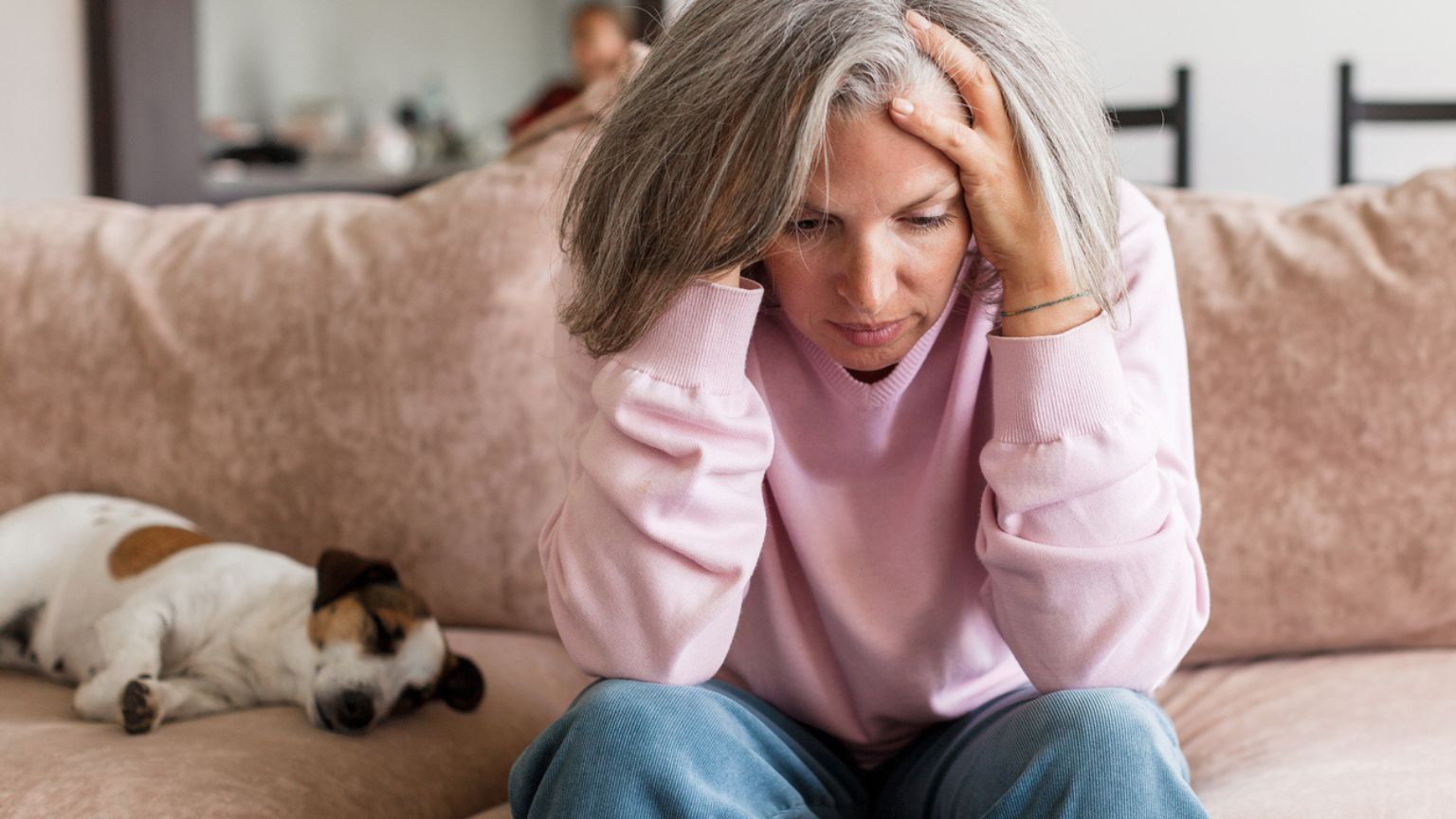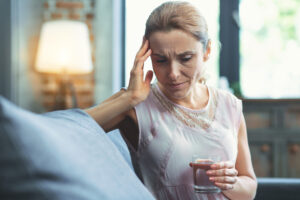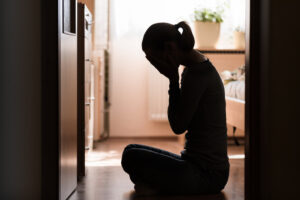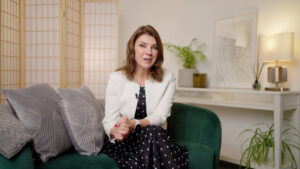Healthista spoke to 55 year old Sue*, who said she mistook her menopause symptoms for dementia. Sue tells Healthista about her Menopausal struggles and how the Healthista Menopause Pack has been her menopausal lifeline
All I knew about the menopause was that your monthly bleeding stops, you probably haven’t bled for 12 months, and that this didn’t happen till you were in your 50’s.
Even as a nurse and educator, I had no idea about the the menopause or peri-menopause, as I hadn’t specialised in gynaecology, my area of expertise was coronary care.
When I was younger, my mother referred to periods as ‘the curse’.
I remember once when my father came home and my mother was on the toilet, he asked me where she was and I replied ‘she’s got the curse’.
Because I said that, he came upstairs and gave me a wallop. I’ll never forget that. Just because I had mentioned something taboo aka periods, I was reprimanded.
My mother would always claim that ‘the curse’ was the worst thing in life, so all I knew about menstruation and women’s intimate health were negative connotations.
Even as a nurse and educator, I had no idea about the the menopause or peri-menopause
I also remember being on holiday with my parents, my mother would have been in her 50’s at the time. She collapsed to the floor in a hotel in Spain, and was crying constantly, it was like she was having a nervous breakdown. We had to get straight on a flight and come home.
My father got hold of the local GP, who came in and said ‘Oh I know what’s the matter with you’. They doped my mother up on Diazepam, and it knocked her out for a couple of days. Ever since then, she’s had problems with anxiety, panic attacks, and is very fragile mentally.
We’ve always put this down to her ‘nervous breakdown’, which now looking back was obviously caused by the menopause – but nobody ever said it.
Because my mother was of the generation to just ‘suck it up and move on’ while being in a high powered job, running her own business – she just flipped and couldn’t take anymore.
Unfortunately, women were and are still expected to keep that stiff upper lip and soldier on through their symptoms.
READ MORE: 6 mind-skin rituals to support women through Menopause
‘Saucepan Sue’
When I first went to my GP and somebody mentioned menopause and peri-menopause to me, I was coming up to age 50. Initially, I went to the GP because I was convinced I had early onset dementia, due to what I now know was brain fog, a common menopausal symptom.
Words wouldn’t come out of my mouth, I couldn’t formulate the sentences I wanted to say. I would be thinking one thing, and a different word would come out.
In fact, everyone in my family would call me Saucepan Sue, after the forgetful character Saucepan Man from Enid Blyton’s book, Folk of the Faraway Tree.
It was an ongoing family joke, ‘Saucepan Sue is talking gobbledygook again’.
Although funny to some, it was extremely debilitating as I was working in education and not being able to find the words to deliver a lecture was incredibly frustrating.
Words wouldn’t come out of my mouth, I couldn’t formulate the sentences I wanted to say
After seeing the GP for this, it was the first discussion I had on menopause, peri-menopause and HRT.
After my appointment, I started to do some research (that’s also when things had started to air on the TV and it was being spoken about), but it was difficult to find information that you knew was coming from a reputable source.
As a healthcare professional, I was well aware that not everything you read on the internet is cast in stone. You have to look where it’s come from, who paid for the research etc.
It was a minefield, and very difficult to find good sources of research, and still nobody seemed to want to talk about it. Especially topics around sex lives being disrupted and the fact that I was feeling completely numb inside!
READ MORE: Sex & the Menopause – how to spice up your midlife sex life
Dementia or Brain Fog? Palpitations or heart attack?
Although the brain fog (which I thought was dementia) seemed like my first symptom coming up to age 50, looking back now I don’t think it was. In fact, I believe I started seeing symptoms of peri-menopause in my early 40’s.
At the time, I visited my GP and explained that I was experiencing heavy periods, which I had never experienced before.
The doctor prescribed me some tablets and said ‘Don’t worry about it, you’ll probably be stopping your periods soon, so there’s no point in giving you a hysterectomy’.
Yet here we are 15 years later and I’ve been told I have fibroids, which is still causing irregular, heavy bleeding, even though I am menopausal.
At the time of the heavy bleeding I also started to have heart palpitations. Coming from a coronary care background, these sudden palpitations were scary, I couldn’t understand what was happening.
these sudden palpitations were scary, I couldn’t understand what was happening
These palpitations used to grip me to the point where I felt like I might pass out. It felt like someone was holding me by the throat and I was being strangled.
I once described that it felt like being put under with an anaesthetic and then coming back again, and it could happen at anytime. It even happened when I was driving once, luckily it was fleeting and by the time I had stopped and took a breath it had started to wear off.
But even after speaking to my GP, nobody, not even a cardiologist, could say what it was except for suspecting it could be down to hormones.
Looking back, and knowing what I know now, I believe that the symptoms of heavy bleeding and palpitations in my early 40’s, was the start of my menopause.
READ MORE: Depressed? Anxious? These 10 nutrients are proven to help
‘I felt like a possessed woman’
Luckily my husband is a mental health nurse and has been very patient with me over the years.
I would fly off the handle, emotions up and down, screaming, shouting – I felt like a possessed woman. It’s unbelievable that our marriage has lasted and we’ve managed to stay together.
I am also a control freak, so not being able to feel that I had control of my emotions was particularly hard for me.
Every time I got an infection or illness on top of my menopausal symptoms, I felt totally depressed, couldn’t see any light at the end of the tunnel, and I would think to myself ‘is this my life now?’ I felt suicidal at some points, the tears just wouldn’t stop.
My husband may not have known about what I was going through, but he understood that whatever was happening to me wasn’t something I could control, and was empathetic. But, many people may not have the luxury of a husband/partner who knows how to deal with these situations.
I would fly off the handle, emotions up and down, screaming, shouting
I now understand why marriages break down, and why men leave their wives. It’s not because they want a younger model, it’s because their wives are acting batty as a fruit cake with a dried up vagina. Who wants to have sex with that?!
I felt like a dried up raisin, fit for nothing and nobody. And you just think what’s the point in living? There’s no joy in anything anymore.
Even though my husband was understanding, he didn’t know anything about menopause. That’s why I made him watch the Davina McCall documentaries, as it’s good for him to learn what I had been and still am going through.
READ MORE: From menopause to UTI symptoms – a Doctor’s Guide to everyday women’s health concerns
Dealing with the symptoms
Years and years ago I used to smoke and drink to deal with issues and stress.
But I constantly battled with the thoughts, ‘Do I seek help or do I soldier on?’, ‘Do I need antidepressants or do I wait for my hormones to balance out?’, ‘How bad do I let this get before I seek help?’.
Instead of getting to this point, surely women should instead be hearing, ‘You’re at a point now where these issues are probably caused by your hormones, here’s what can help you manage through this transition’.
If I had had help ten to fifteen years ago when all this started, then maybe I wouldn’t have had such an awful time. I mean getting help for these women earlier rather than later, could quite literally save peoples lives. Women have taken their own lives because they have been in such crisis, and families have broken apart, marriages broken down.
Women have taken their own lives because they have been in such crisis
When all these little things start to occur that are affecting your life, why are we told to wait or soldier on when there is help available?
That’s when the hopelessness and depression sets in, and for many women that might be the first time they eventually seek help, rather having the knowledge to seek help for the small things before it comes to that.
Why have I and many other women had to fight a battle with these doctors, when all we are asking, is for the hormones to be replaced that our bodies make? I’m not asking for something that my body doesn’t make, I’m just asking the doctors to help me maintain the normal hormonal levels – a normal part of every woman’s hormonal package.
READ MORE: Leading Menopause Expert Dr Louise Newson reveals 5 common HRT myths most people believe
My menopausal lifeline
Fast forward to now, I am currently 55 years old, and thankfully the menopause is being spoken about more than ever before. Magazines, TV programmes, radio and even Parliament are finally giving the menopause the attention it needs.
One such magazine is Healthista, who covers the menopause on their website, and now offers in-depth menopause information and advice in their Menopause Pack.
I particularly liked the format of the Healthista Menopause Pack, and website. Even though I had already done lots of research on Menopause, I still learnt plenty of new information and everything was delivered via videos in easy to understand bite-sized chunks.
It didn’t go on and on or overwhelm me with information. It was concise, and easy to manage – because let’s face it, people don’t have time to watch long informational videos, or read long books!
Having everything all in one place, was an excellent holistic approach to helping menopausal women, covering not only what is happening right now and what will the future look like, but also how to deal with current symptoms.
Having everything all in one place, was an excellent holistic approach to helping menopausal women
I also loved the order of which the information was presented. You first learn about hormones and what causes the menopause. You then learn what changes are happening to your body and what sort of symptoms to expect.
For example I learnt why the tummy and abdomen area expands in later years – because the fat cells are trying to hang on to the oestrogen that’s left, after oestrogen levels drop significantly. These fat cells are trying to hold onto the oestrogen via the abdomen to maintain oestrogen levels and that’s a reason women see an increase in abdominal fat – I was amazed that this is the reason!
I gained a full understanding on how hormones play such a key role in maintaining women’s health and how testosterone is something we produce, and I never realised the important role testosterone plays during the menopause.
Everyone should know about this. This needs to be taught in schools.
The Healthista Menopause Pack also highlighted the importance of incorporating weight training into our everyday lives, and how balance exercises can help to maintain and support bone health and your posture – I had no idea we could do something to actually maintain bone health!
READ MORE: Menopause symptoms at work: Government rejects calls for ‘menopause leave’ – a note from the Editor
The Menopause as a positive
My favourite take away from the Healthista Menopause pack was looking at the menopause with a positive frame of mind. Having had such negative ideas around the menopause before, the positive psychology section of the Menopause Pack made me look and evaluate what my preconceptions were.
It helped me understand why these negative thoughts and emotions were there, and to instead look at the menopause as a time that will get better. In fact, there may even be positive things that come out of the menopause, rather than focussing on all the doom and gloom surrounding the subject.
It helps put into perspective that women CAN feel like they are gaining some control back, because most of the issues linked to these women during menopause, is because they no longer feel in control of themselves, their bodies or their emotions.
there may even be positive things that come out of the menopause
I have been in such a dark place at points thinking is ‘this my life now, is it ever going to get better?’ – I wish I had had this Menopause Pack when I was feeling that way. Everyone I now meet who is in need, I send them to the Healthista Menopause Pack as a reliable source of information and advice.
The menopause is just a stage and even if you feel like there’s no light at the end of the tunnel, it’s nice to hear from the experts that it is going to get better.
Since working my way through the Menopause Pack, I have started to take St John’s Wort to lift my mood, magnesium to aid sleep and cod liver oil to protect my joints. I can also now say that my palpitations, night sweats and other symptoms have disappeared, thanks of course to Hormone Replacement Therapy (HRT) and the Healthista Menopause Pack.
The Healthista Menopause Pack, is perfect for every person with a womb. It’s important and imperative to have an easily accessible source of information, full of research, evidence and help.
HEALTHISTA’S ANSWER TO MENOPAUSE; MENOSTART: PRESS PLAY, NOT PAUSE.
The Healthista Menopause Pack is a fully comprehensive online video workshop, led by Dr Dawn Harper; affordable, accessible and covering all aspects of the menopause, for those who need it most.
With expert advice and information from seven credible menopause industry experts, we hope that this online resource will help women navigate common health and wellness changes and challenges they may experience before, after and during the menopause.
Like this article? Sign up to our newsletter to get more articles like this delivered straight to your inbox.



























































